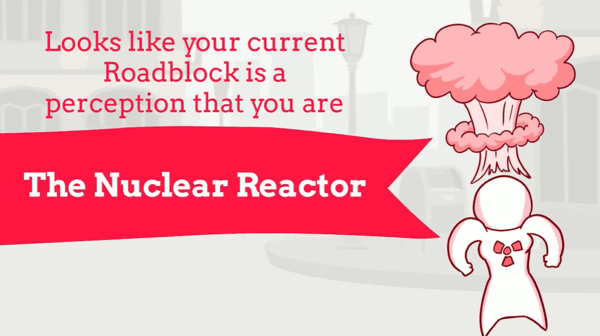Warning Signs of Toxic Leadership Part 8: Anger in the workplace
If you are just joining this 12-part series, you may want to refer back to previous posts about other personas that can lead to workplace toxicity. We’ve already examined the behaviors of Scrambler, Dinosaur, Climber, One-Hit Wonder, Intimidator, High & Mighty, and Lone Wolf styles.
All told, we’ll cover 12 different types of behaviors and attitudes that can derail your career. Usually, these show up early but get ignored. They become blind spots. The longer you wait to work on them, the harder it is to adjust.
What makes it even more difficult to identify these career roadblocks and blind spots is that they usually start out as strengths. The very same behaviors have served you well in the past. They might even be part of your identity. Seeing them as detrimental to yourself or others will not be easy.
Try to consider the information presented in this series objectively. This is not about “throwing the baby out with the bath water.” It’s about understanding the difference between positive and negative effects. And it’s all a matter of individual choice.
Related posts:
- Part 1: The Scrambler
- Part 3: The Climber
- Part 4: The One-Hit Wonder
- Part 5: The Intimidator
- Part 6: The High & Mighty
- Part 7: The Lone Wolf
- Part 9: The Mouse
- Part 10: The Control Freak
- Part 11: The Artful Dodger
- Part 12: The Rebel
Warning Signs of Toxic Leadership: Are You The Nuclear Reactor?
Kaboom!
It’s been building for a while, and you just lost your cool. You had an emotional outburst. It may have been angry and explosive. Or it may have been a subtle, quiet eruption, and now you’re sullen and withdrawn. Either way, people know that now is not a good time to approach you.
Whether real or perceived, you may be seen as someone who:
-
Is volatile and unpredictable.
-
Seems unable or unwilling to control emotional outbursts and reactions to difficult situations.
-
Can’t handle the pressure. Snaps or flies off the handle without much warning.
-
Uses emotions to gain sympathy or convey needs that could have been addressed in other ways.
-
Allows emotions to interfere with work performance and workplace relationships.
In the past, this has served you well or manifested as a positive when:
-
You want others to understand that you’ve reached your outer limits of tolerance or workload.
-
It seems like no one understands just how much pressure you’ve been under.
-
You’re seeking comfort and sympathy from others.
-
Others seem to be taking advantage of you or expecting more than you are able to deliver.
-
You’ve exhausted alternatives for trying to communicate about the stress you’re experiencing.
Maybe this persona isn’t who you really are. It’s not who you intend to be. It feels unfair to be labeled this way. Nonetheless, if people see you as The Nuclear Reactor, something caused them to see you this way. For them, this is real.
What Can I Do if I might be The Nuclear Reactor?
 Make sure you don't have a blindspot when it comes to your soft skills or style. Take the free, self-paced course called The Essentials of Personal Effectiveness to build transferable skills and improve the quality of workplace interactions.
Make sure you don't have a blindspot when it comes to your soft skills or style. Take the free, self-paced course called The Essentials of Personal Effectiveness to build transferable skills and improve the quality of workplace interactions.
If you’re encountering a potential blind spot, feel stalled in your career, or are struggling with interpersonal skills in the workplace, you might benefit from working with a certified executive coach. Most senior-level executives have worked with a professional coach at some point in their career. Check out this Forbes article for more about the benefits of coaching.
Ultimately, YOU are responsible and YOU are in control of your choices about how to lead and how to interact with others in the workplace. Now that you’ve got awareness, it’s time to take action.
If you are, indeed, The Nuclear Reactor, here are some immediate actions you can take to change others’ perceptions and exhibit these behaviors less frequently.
-
Find ways to relieve the pressure gradually instead of letting it build up to an explosion.
-
View constructive feedback as others’ attempts to support and help, not hurt, you.
-
Pause and decide whether you’d rather be emotional or effective in a given situation.
-
Take space. When you feel stressed, pull back instead of getting enmeshed in unhealthy ways.
If you’re wondering whether or not it’s worth it to make these changes, you should know that there is an impact to being perceived as The Nuclear Reactor. Failure to control emotions in the workplace can impact people you work with.
There are also consequences for you, including:
-
The biggest risk you take when you allow Nuclear Reactor behaviors to go unchecked is that people may see you as unable to control yourself. This anger in the workplace causes them to think you can’t be trusted to control situations or to take on larger responsibilities. Each meltdown diminishes their confidence in you.
-
Some may also view your emotional outbursts as manipulative attempts to gain sympathy or attention. Since it appears that your emotions boil over without warning, they assume you can turn them off and on. They may think you’re using emotions to deflect attention away from poor performance or to look like the victim in any interpersonal conflict. Those who prefer a logical and calm manner may lose respect for you.
-
You also run the risk of losing relationships. One day you seem to be taking things in stride, but the very next day you are a powder keg. When people see you as volatile, they retreat for self-preservation.
This choice is yours. Choosing to deny, ignore or embrace your Career Roadblock characteristics are all legitimate choices. You don’t have to change a thing.
On the other hand, if these behaviors or perceptions are preventing you from reaching your goals, it’s also a legitimate choice to modify what you’re doing.
Either way, put yourself in control. Be aware of the perception, your choices surrounding that perception, and the impact of being perceived in this way.
How Can I Learn More About This Roadblock (and Others, Too)?
The Nuclear Reactor is one of 12 behavior sets that can become career roadblocks. When others are observing the issues with someone who is stuck and has these blind spots, they frequently use terms to describe these roadblocks (e.g. “control freak” or “dinosaur”).
You can learn about all the career roadblocks that lead to toxic leadership by following this blog series.

